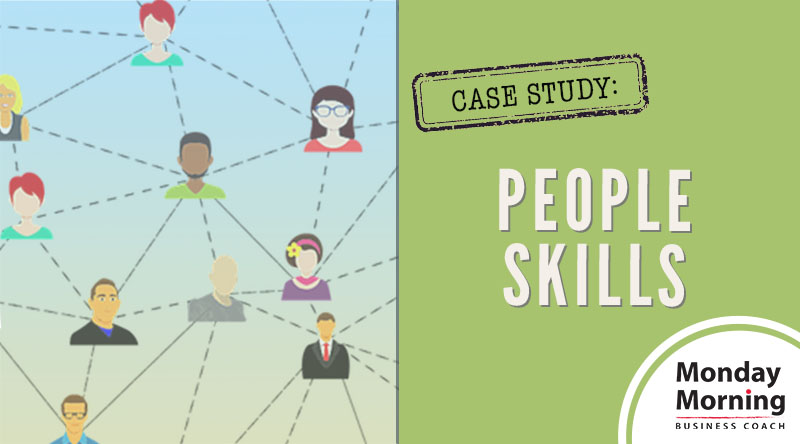Last week, we shared the 5 Must-Have People Skills to Succeed in Business and in Life. As a quick reminder, here they are:
- Influence
- Communication
- Dynamic Dialog
- Openness to Many Truths
- Ownership of Mistakes
Often, we nod our heads when we hear these skills, recognizing them but not really understanding what they look like in action. So, we’d like to share the story of Tara.
Tara was a successful financial executive at a midsize corporation. She was probably one of the most skilled accounting professionals you could ever meet. She was bright, strategic, and could crunch numbers with the speed and precision of a calculator (well, almost).
Because of her success, when the organization was faced with the retirement of the CEO, Tara was asked by the board to be the interim CEO. She jumped at the chance to step more fully into her leadership with this new challenge. Yet, within a month of taking the reins, she found herself getting feedback that she was experienced as being disrespectful and arrogant, at which time she sought us out for coaching and support.
As an expert in finance, Tara was adept at dealing with numbers and with people who understood the language of finance, but she had little experience dealing with the people across the organization who handled the design, development, sales and marketing of their product line. She quickly realized that she needed to develop her people skills if she was going to succeed in the interim position and in future leadership roles.
We talked with Tara about the 5 must-have people skills. Like many of us, Tara was more adept with some of the people skills than with others. For instance, she was very comfortable owning mistakes and believed strongly in communicating openly with others. Where she was struggling was being open to many truths, being influenced by others and engaging in dynamic dialog.
As an expert in finance, Tara loved that numbers were consistent. A five is always a five. And while she understood that there were often differences in the interpretation of numbers, she found it challenging when people she depended on brought her very different truths about the same event. It left her feeling a lack of confidence in her team and made it hard to be in a dynamic dialog—where their thinking influenced her thinking.
Through our work together, she realized that in order to move forward successfully with her team and the board, she needed to work on these three areas.
We met weekly to discuss the ways she could expand her people skills and agreed that she would experiment with some new behaviors to see if they increased her impact and the success of her team.
These are a few examples of what Tara did differently:
Openness to Many Truths: Tara found it frustrating that there were such different perspectives and interpretations of the same event. It often led her to close her door and make top-down decisions that undermined her credibility as a leader, particularly in this interim role.
We recommended that Tara consider the differing input as a way to get a glimpse of the business from another vantage point. Then, in dynamic dialogue, the group could create a shared understanding of what was going on that would influence their shared decisions about how to proceed.
Dynamic Dialog: We helped Tara understand that she didn’t have to stop when she encountered different truths but, instead, they were the starting point for a more dynamic dialog where the team shared information. With that information they explored, together, how to fulfill the needs of the business.
Influence: As the team shared the many perspectives and truths that they saw, and as they moved into a dynamic dialog about how each perspectives identified some core issues that needed attention, Tara was able to ask them how they would suggest they proceed (she asked for their influence). She then added her perspective about how to proceed (she influenced them), and together they agreed to a path forward.
This approach to the work began a new way for Tara to work with her team that included their wisdom and perspective in the planning, and created shared ownership for success moving forward.
Her team and the board both felt better about her leadership and Tara, to her credit, asked them to tell her when she reverted back to “finance thinking” vs. “leadership thinking.” At first her team was wary to do so, but because Tara was comfortable with owning mistakes and direct communications, they came to have confidence that they could, in fact, let her know when they felt unable to influence her.
Tara kept this list of skills on a post-it note on her computer. There were still days when she wanted to pull up some spread sheets and make decisions in a vacuum—this people stuff seemed slow and inefficient. Over time, however, she saw that taking the time for the people stuff up front resulted in much greater team alignment and their awareness of needing to engage others to get buy-in before decisions were made. Tara’s growth was growing her team.
Like any of us learning a new skill, Tara stumbled at times; but with regular coaching and reflection, she gained skills and wisdom during the 12 months she served in the role. At the end of that year, she was identified by a search firm to lead another organization which she continues to lead to this day.
You can do this!
contact us today
about our coaching services.

